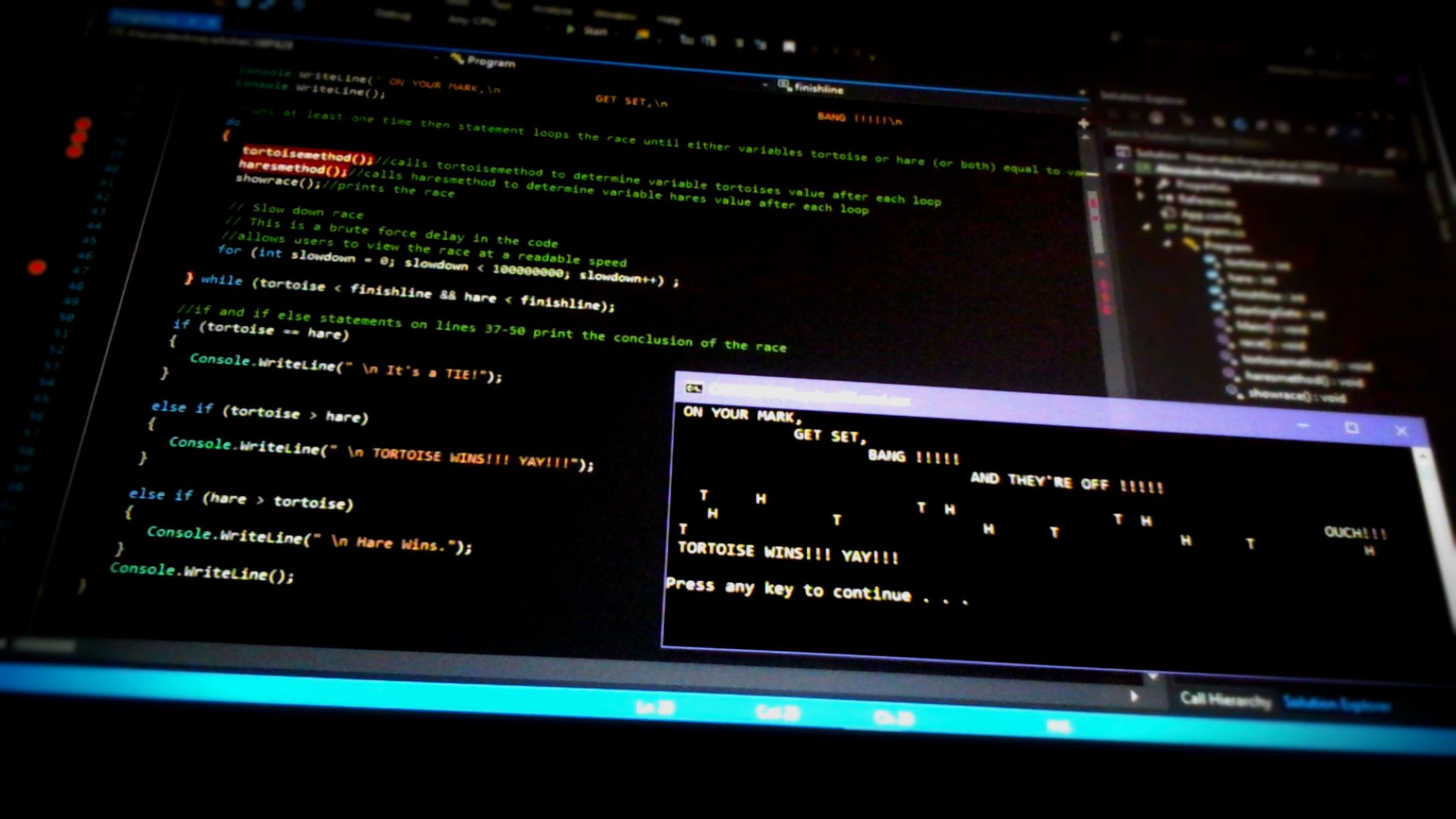Introduction
Welcome to the world of Unity, a powerful game development platform that has become increasingly popular among developers. If you’re interested in creating games or interactive experiences, then you’ve probably heard of Unity. One question that often comes up is: What coding language does Unity use?
Understanding the programming languages used in Unity is crucial for anyone looking to dive into game development or expand their knowledge in this field. In this article, we will explore the primary coding languages supported by Unity and discuss their characteristics and uses.
Before we dive into the specifics, it’s important to note that Unity supports multiple coding languages, providing flexibility for developers with different backgrounds and preferences. The three main languages used in Unity are C#, UnityScript (JavaScript), and Boo.
Each of these languages has its own features and benefits, allowing programmers to bring their creative visions to life in Unity. Whether you’re a seasoned developer or just starting your programming journey, understanding these languages will help you make the most out of Unity and unlock its full potential.
In the following sections, we will explore each coding language supported by Unity, discussing their strengths, similarities, and differences. By the end of this article, you will have a better understanding of which language suits your needs and how to leverage it to develop captivating games and interactive experiences.
Unity and Scripting
Unity is a versatile game development platform that allows developers to create interactive and visually stunning games for various platforms, including desktop, mobile, and consoles. One of the key elements that make Unity so powerful is its scripting capabilities. Scripting in Unity refers to the process of writing code to create interactions, behaviors, and gameplay mechanics within the Unity environment.
Scripting in Unity enables developers to create complex interactions and behaviors by utilizing the supported coding languages. By writing scripts, developers can control the movement of characters, trigger events, implement game logic, and much more. Unity supports a range of programming languages that can be used for scripting, including C#, UnityScript (JavaScript), and Boo.
C# is the most commonly used language for scripting in Unity. It is a powerful and versatile language that offers a wide range of features and has excellent integration with the Unity engine. C# provides a strong type system, automatic memory management, and extensive libraries and frameworks that make game development in Unity efficient and streamlined.
UnityScript, which is a variation of JavaScript, is another language used for scripting in Unity. While it shares some similarities with JavaScript, UnityScript has been customized to work specifically with Unity. It offers a more flexible, dynamic, and forgiving syntax compared to C#, making it a popular choice for beginners or developers with a background in web development.
Boo is a lesser-known language used for scripting in Unity. It is a statically-typed language that combines the best features of Python and C#. With its clean and concise syntax, Boo provides an alternative for developers who prefer a more Pythonic approach to programming.
Regardless of the language you choose, scripting in Unity involves creating and attaching scripts to game objects, defining their behaviors and interactions. Through scripting, you can control the movement of characters, handle collisions, manage animations, and implement game mechanics such as scoring systems and power-ups.
Scripting in Unity offers developers the flexibility and control to bring their game ideas to life. Whether you prefer the robustness of C#, the familiarity of JavaScript, or the simplicity of Boo, Unity’s scripting capabilities are designed to empower you to create immersive and engaging games.
C#
C# is the most widely used coding language for scripting in Unity. It is a powerful and versatile language that offers a range of features and a vast ecosystem of libraries and frameworks. C# is an object-oriented language that provides strong typing and automatic memory management, making it a reliable choice for game development.
Unity has built-in support for C# scripting, allowing developers to easily write and execute code within the Unity environment. The integration between Unity and C# is seamless, providing a robust and efficient development experience.
One of the key advantages of using C# in Unity is its performance. C# is a compiled language, which means that the code is converted into machine-readable instructions before execution. This compilation process results in efficient and optimized code, ensuring smooth gameplay and optimal resource utilization.
In addition to its performance benefits, C# offers a rich set of features that enhance the development process. It includes a comprehensive set of standard libraries and frameworks that simplify common tasks, such as input handling, file IO, networking, and more. Furthermore, C# supports advanced concepts like multithreading, delegates, and events, enabling developers to create complex and interactive games.
C# in Unity also embraces the object-oriented programming paradigm. This means that developers can define classes, objects, and inheritance relationships to create modular and reusable code. Object-oriented programming allows for code organization and promotes reusability, making it easier to maintain and extend projects as they grow in complexity.
Moreover, the Unity API, which provides access to the engine’s features and functionality, is primarily implemented in C#. This tight integration between C# and the Unity API allows developers to leverage the full potential of the engine and utilize its extensive capabilities.
Learning C# for Unity scripting opens up a world of possibilities in game development. With its performance, feature-rich nature, and smooth integration with Unity, C# enables developers to create immersive and high-quality games that captivate players.
UnityScript (JavaScript)
UnityScript, also known as Unity’s version of JavaScript, is another coding language supported by Unity for scripting purposes. It shares similarities with JavaScript but has been customized to work specifically with Unity’s game development environment.
One of the main advantages of UnityScript is its familiarity to developers who have experience with web development and JavaScript. If you’re already proficient in JavaScript, transitioning to UnityScript will be relatively seamless. The syntax and structure of UnityScript closely resemble JavaScript, making it easier to write and understand.
UnityScript is a dynamically-typed language, meaning variables do not have strict types assigned to them. This dynamic nature allows for more flexibility when developing games as it reduces the need for explicit type declarations. It also offers a forgiving syntax, making it easier for beginners to get started with scripting in Unity.
While UnityScript is not as performant as C#, it is still a viable option for many game development projects. Particularly for smaller or less complex games, UnityScript can provide a quick and efficient way to prototype and iterate on game mechanics.
UnityScript has access to Unity’s API, allowing developers to utilize the engine’s features and functionality. This means that you can still take advantage of all the powerful tools and resources provided by Unity, regardless of the language you choose.
Furthermore, Unity offers a feature called “Automatic Conversion,” which allows you to convert C# scripts to UnityScript and vice versa. This feature can be helpful when collaborating with others or when using assets or resources that are written in a different scripting language.
While UnityScript is still supported in Unity, it’s important to note that C# is the recommended and more widely used scripting language within the Unity community. Unity itself has shifted its focus towards C#, and new features and improvements are often implemented with C# in mind.
Ultimately, the choice between C# and UnityScript depends on your programming background, personal preference, and the scope and complexity of your game project. Both languages have their own strengths and can be used to create compelling games in Unity. Whether you choose C# or UnityScript, Unity provides the tools and support you need to bring your game ideas to life.
Boo
Boo is a lesser-known coding language supported by Unity for scripting purposes. It is a statically-typed language that combines the best features of Python and C#. With its clean and concise syntax, Boo offers an alternative scripting option for developers who prefer a more Pythonic approach to programming.
One of the main advantages of using Boo in Unity is its simplicity. The language is designed to be easy to read and write, making it accessible to beginners and experienced developers alike. Boo focuses on code readability and encourages clean and elegant code structure.
Boo supports object-oriented programming, allowing developers to define classes and objects and utilize inheritance and encapsulation. This enables code organization and promotes code reusability, making it easier to maintain and manage complex game projects.
Similar to C# and UnityScript, Boo has access to Unity’s API, which provides access to the engine’s features and functionality. This means that Boo users can take full advantage of Unity’s powerful tools and resources in their game development process.
Boo is known for its integration with co-routines, a programming concept that enables asynchronous execution and allows for more complex and flexible game mechanics. Co-routines in Boo make it easier to handle complex animations, AI behaviors, and other time-based events in Unity.
Another notable feature of Boo is its extensive support for macros. Macros allow developers to define custom shortcuts or shortcuts for commonly used code patterns, reducing the amount of repetitive coding and enhancing productivity.
Despite its strengths, it’s important to note that Boo is not as widely used or documented as C# or UnityScript within the Unity community. This means that finding resources, tutorials, and support for Boo scripting may be more limited compared to the other two languages.
While Boo may not be the most popular choice for Unity scripting, it can still be a viable option for developers who are comfortable with its Pythonic syntax and prefer its simplicity and elegance. The decision to use Boo ultimately depends on personal preference and the specific requirements of your game project.
Regardless of the language you choose, Unity provides a versatile and powerful game development platform that allows you to bring your creative visions to life.
Choosing the Right Language
As a game developer using Unity, choosing the right coding language for your project is crucial. Each language supported by Unity has its own strengths and characteristics, so it’s important to consider your programming background, project requirements, and personal preferences when making your choice.
If you are new to game development or programming in general, starting with UnityScript (JavaScript) or Boo may be a good option. These languages offer simplicity and a forgiving syntax, making them easier to learn and grasp for beginners. They also provide a smoother transition if you have prior experience with web development or Python programming.
However, if you have previous experience with programming or come from a software development background, C# is highly recommended. C# is a powerful and versatile language that offers excellent performance, a robust ecosystem of libraries and frameworks, and deep integration with Unity’s engine and API. It is the most widely used language within the Unity community, which means there is a wealth of resources, tutorials, and support available.
When considering which language to choose, it’s also important to think about the scalability and complexity of your game project. If you are building a smaller or less complex game, UnityScript or Boo might be suitable options, offering simplicity and faster prototyping. However, for more complex games with extensive gameplay mechanics and performance requirements, C# is often the preferred choice due to its performance, type safety, and scalability.
Additionally, collaboration and community support should be considered. C# has a large and active community within the Unity ecosystem, which means you’ll have access to a wide range of resources and support from fellow developers. UnityScript and Boo, being less popular, have less community support and fewer available assets and tutorials.
Ultimately, the decision comes down to your personal preferences, project requirements, and level of expertise. Regardless of the language you choose, Unity provides a powerful and flexible development platform that enables you to create stunning and immersive games.
Conclusion
In conclusion, Unity offers a range of scripting languages to accommodate the needs and preferences of developers. Whether you choose C#, UnityScript (JavaScript), or Boo, each language has its own unique characteristics and strengths.
C# is the most widely used language in Unity and provides excellent performance, a vast ecosystem of libraries and frameworks, and seamless integration with the Unity engine. It is the recommended language for developers with previous programming experience or those looking for a robust and scalable solution for their game projects.
UnityScript (JavaScript) and Boo offer alternatives for developers who prefer simpler syntax and a more forgiving language. UnityScript, especially for those familiar with JavaScript, allows for quicker prototyping and faster development cycles. Boo, with its clean and concise Pythonic syntax, offers simplicity and elegance.
When choosing the right language, consider your programming background, project requirements, and the scalability and complexity of your game. Beginners may find UnityScript or Boo more accessible, while experienced developers and those working on larger projects may benefit from the power and performance of C#.
Remember that the choice of language ultimately depends on your personal preference and project needs. Whichever language you choose, Unity provides a robust game development platform that enables you to bring your creative ideas to life.
So go ahead, explore the different coding languages supported by Unity, delve into the documentation, and experiment with different languages to find the one that suits you best. With your chosen language and Unity’s powerful tools and resources, you’ll be well-equipped to create captivating and immersive games that entertain and inspire players around the world.

























